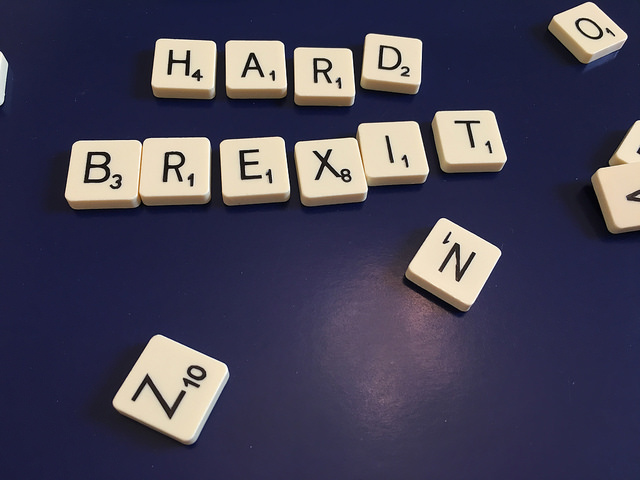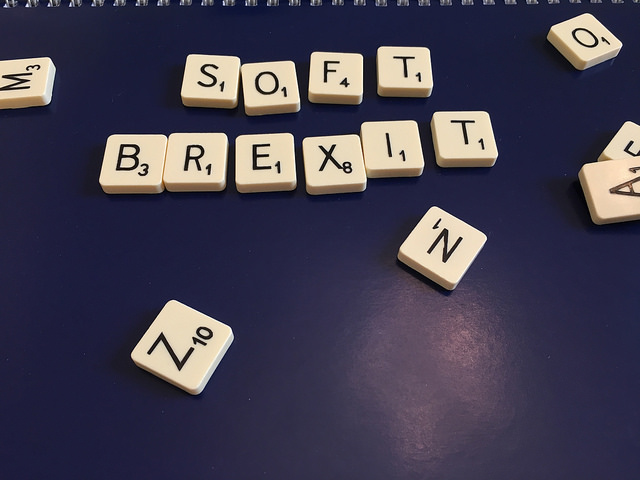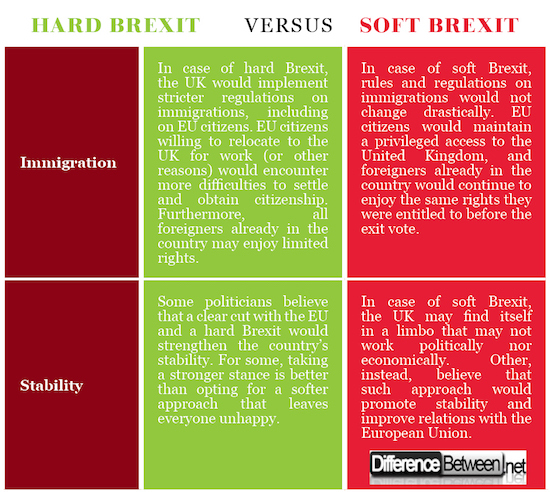Difference Between a Hard Brexit and Soft Brexit
On 23 June 2016, 51,9% of the participating electorate in the UK voted to leave the European Union, turning the United Kingdom in the first country deciding to leave the group of 28 states, which was formally established with the entrance into force of the Maastricht treaty in 1993.
While central and eastern European states have been pushing to be included in the group, some western European countries have begun to doubt the effectiveness and convenience of such system. After the 2008 economic crisis – which started in the U.S. but had repercussions all over the world, particularly in Europe, there were rumors of a possible exit of Greece from the Union (Grexit), as the country had not proven able to meet its economic targets. After Greece was bailed out, the United Kingdom entered a phase of discussions, public campaigns and negotiations, which ultimately led to the Brexit vote in June 2016.
Even though the United Kingdom has never adopted the Euro – the common currency in most European Union countries – negotiations and discussions to leave the Union have been proceeding at a slow pace and seem more complicated than ever, with all European leaders involved in the process.
The UK government has been pushing for agreements that favor the United Kingdom, while Europe seems determined not to let the UK go without a fight. Hard Brexit vs soft Brexit means UK first vs EU first: for now, the debate remains open and negotiations seem far from being concluded.
What is Hard Brexit?
Hard Brexit is the favorite option of all committed Brexiters, and of all UK citizens who want a clean cut with the European Union and all its regulations.
Hard Brexit puts the UK and the interest of its citizens first, but it also implies giving up privileges that are entitled to EU members only. Should a hard Brexit process unfold, the UK would give up full access to the single market, and would renounce to the principle of free movement of people and goods, which applies within the EU.
In the case of hard Brexit, the UK would also enjoy full control of its borders and would have the possibility of applying more strict regulation measures, without having to respect the Dublin principle and all other treaties that regulate immigration and movement of people within the EU. Furthermore, a hard Brexit would change the rules of the game regarding matter of trade – with EU and non-EU states – and would have a significant impact on (almost) all bilateral and multilateral treaties the UK is a part of.
Finally, hard Brexit may cause frictions and discrepancies within the UK itself – in particular with Scotland.
What is Soft Brexit?
The second possible outcome of Brexit negotiations in soft Brexit. In this case, the relationship between the UK and the EU would remain as close as possible, and many treaties and conventions would remain in force.
Soft Brexit is the preferred approach (and the hoped outcome) of all the so-called “Remainers” – all those who voted to remain in the European Union and who believe that a hard Brexit would have serious consequences on the economy and budget of the United Kingdom.
In case of soft Brexit, the UK might be allowed to access the European single market and to remain in the European custom union – meaning that all exports would not be subject to border controls. In other words, a soft Brexit may allow the United Kingdom to leave the European Union, while remaining a member of the European Economic Area (EEA).
Similarities between Hard and Soft Brexit
Hard and soft Brexit employ very different approaches to discussions and negotiations, but in both cases the outcome would be the same. The majority of the UK participating electorate voted to leave the European Union – be it in a hard or soft way. Therefore, we can identify few similarities between hard and soft Brexit:
- In both cases, the United Kingdom is leaving the European Union and is regaining its independence, free from (most) international regulations that apply to all member states of the union;
- In both cases, a large part of the UK population will not be happy with the outcome. As the number of people voting to leave the EU was only slightly higher than the number of voting citizens who voted to stay in the Union (51.9%), there is a large portion of the population who will be disappointed. Furthermore, of the 51.9% of people who voted “yes,” not all were in favor of hard Brexit, nor all agreed for soft Brexit: as such, the number of unhappy citizens is bound to rise; and
- In both cases, there will be significant consequences for the European Union and Europe in general. Although a “divorce” between the UK and the EU is not likely to shift major international alliances and partnerships, it may have long-term consequences and may even trigger a domino effect, with more European countries possibly looking to leave the union.
Difference between Hard and Soft Brexit
While negotiations are ongoing, public opinion on hard and soft Brexit continues to shift. For now, it appears that the UK government may be more inclined to opt for a hard Brexit approach, but discussions and summits are far from over. The two approaches are very different and may have very different consequences:
- Custom union: one of the main topics of discussion is the economic aspect of Brexit. Should the UK leave the European custom union (in case of hard Brexit), it would cease to be a part of the single market, and UK goods would be subject to higher tariffs, checks and controls. Conversely, in case of soft Brexit, the UK is likely to remain a part of the single market, thus continuing to expedite the trading process, and preventing hikes in tariffs on English goods;
- Economy: opinions of Brexiters and Remainers are very conflicting on this matter. Some believe that having a hard Brexit would boost the UK economy, promoting local entrepreneurs and allowing the UK to regaining a central role in the global economy. Conversely, other argue that a hard Brexit would make the UK’s economy more vulnerable, and would isolate the country, thus losing all benefits of common and international trade agreements; and
- Open borders: the European Union is based on the principle of free movement of goods, people and capital. Reducing bureaucratic processes and travel barriers has created a common market, where people can move freely (more or less) and goods can be exchanged in a more expedite way. In case of hard Brexit, the UK would not be able to enjoy the benefits of open borders and open markets.
Hard Brexit vs Soft Brexit
The economic aspect is not the only factor that influences talks over Brexit. The process of exiting the European Union is proving incredibly complex and time-consuming, and the balance has yet to shift towards hard or soft Brexit. Other differences between the two include:
Summary Hard Brexit vs. Soft Brexit
The decision of the United Kingdom to leave the European Union surprised many, and sparked concern and uncertainty all over the world. The EU has so far tried to use a hard approach in all negotiations, as European leaders do not want Brexit to start a domino effect, with more countries mulling to leave the group. The stance of the UK, instead, is not clear. Negotiations are led by Theresa May, who has struggled to create a government – after the outcome of the national elections did not have the hoped result – and who is facing the opposition of other parties. The UK is set to leave the EU in early 2019, but negotiations and talks are far from being completed. For now, the balance seems to be shifting slightly towards a possible hard Brexit, but it is still too soon to make predictions on the outcome.
- Difference Between Michelle Obama and Melania - January 29, 2019
- Difference Between Trump and Modi - December 4, 2018
- Difference Between Carbon Tax And Cap And Trade - December 4, 2018
Search DifferenceBetween.net :
Leave a Response
References :
[0]Ahmed, Kamal. "What Does ‘Hard’or ‘Soft’Brexit Mean?." BBC News 29.9 (2016).
[1]Barker, A., and Ch Giles. "Hard or soft Brexit? The six scenarios for Britain." FinancialTimes.-June 23 (2017): 2017.
[2]Menon, Anand, and Brigid Fowler. "Hard or soft? The politics of Brexit." National Institute Economic Review 238.1 (2016): R4-R12.
[3]Image credit: https://www.flickr.com/photos/jonathanrolande/29690173254
[4]Image credit: https://www.flickr.com/photos/jonathanrolande/30234604431



